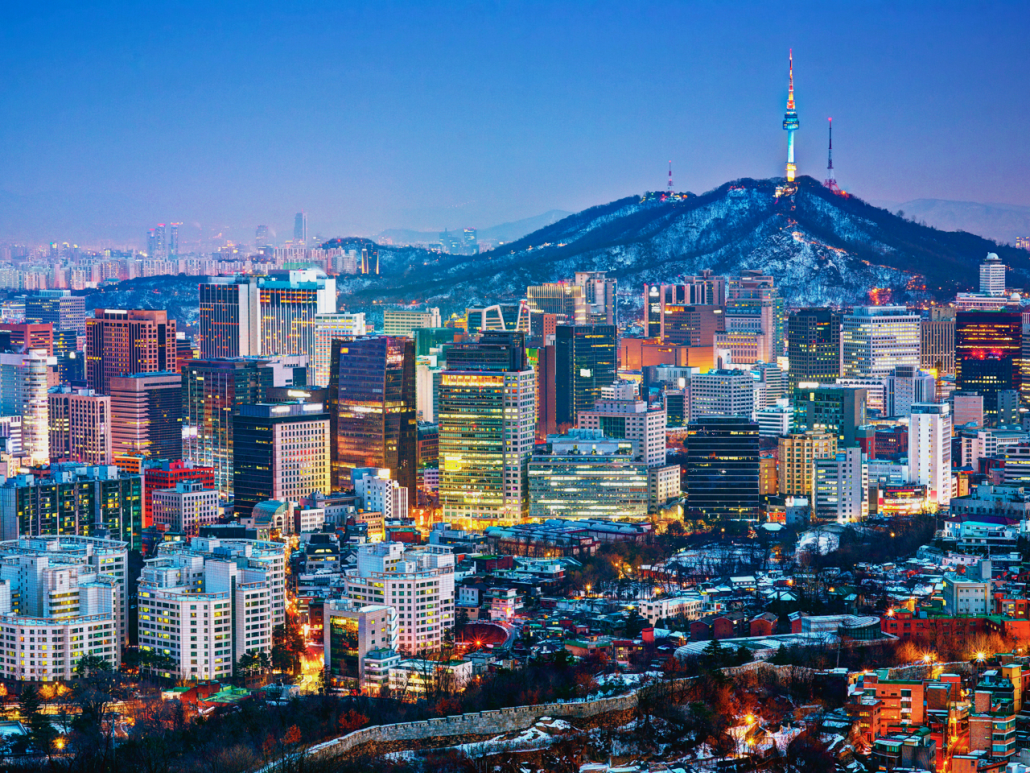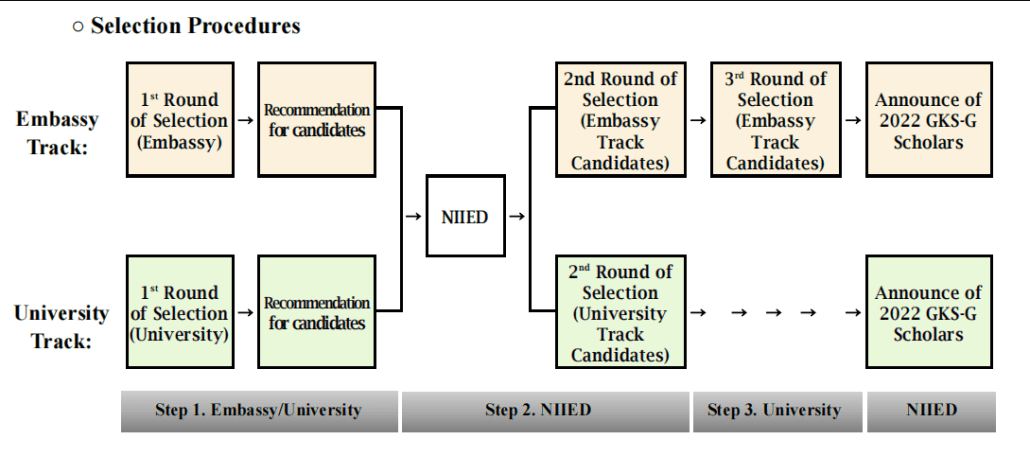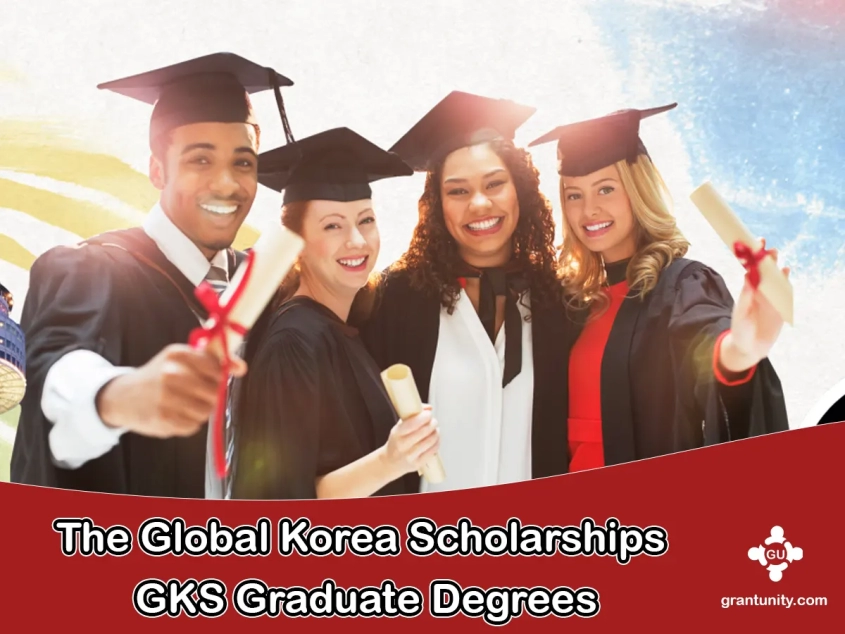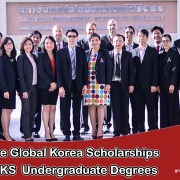Global Korea Scholarships for Graduate Degree- GKS 2024-2025
The Global Korea Scholarship for Graduate Degrees, commonly known as GKS, is a renowned program offered by the South Korean government to international students who wish to pursue their postgraduate studies in South Korea. The primary goal of GKS is to promote Korea as a world-class higher education destination while providing exceptional students with financial aid, academic opportunities, and cross-cultural experiences. In this article, we will delve into the GKS scholarship program for the academic year 2024-2025, highlighting its benefits, eligibility criteria, application process, and the transformational opportunities it provides to international students who aspire to pursue their postgraduate studies in Korea.
The GKS scholarship program is an important initiative that attracts talented individuals from all over the world to explore Korea’s exceptional educational institutions and vibrant culture. The program aims to promote academic excellence and cultural exchange, offering a comprehensive package that covers tuition fees, monthly allowances, round-trip airfare, Korean language training, and medical insurance. With this financial support and resources, international students can pursue their graduate studies in various fields, including engineering, natural sciences, social sciences, humanities, and more. The GKS scholarship not only fosters academic growth but also facilitates cross-cultural understanding, as recipients have the chance to immerse themselves in Korea’s rich cultural heritage and build lasting connections with students from diverse backgrounds.

Eligibility for Global Korea Scholarships Graduate Degree Program
Applicants must meet all fundamental eligibility requirements to apply for Global Korea Scholarships 2024. Students often inquire about eligibility criteria, and we advise that they carefully review the requirements before applying.
1.Both the applicant and their parents must have been born outside of Korea.
2. The candidate should not hold citizenship in Korea.
3. Applicants are required to be in sound physical and mental health, ensuring a seamless completion of their degree program in Korea.
4. For most graduate degree programs, applicants should generally be under 40 years old at the time of application. It’s important to note that the age limit may vary based on specific countries or scholarship categories.
5. Before arriving, graduate students must have attained either a master’s or a bachelor’s degree.
6. The candidate is expected to maintain a CGPA of at least 80%, reflecting their academic performance in their prior educational institution.
7. Prior to applying, candidates should not have been enrolled in a graduate program or received a Korean government scholarship for the same level of degree.
8. Candidates with a CGPA of 90% or above, who either currently hold or have previously held a GKS award, are eligible to reapply. These candidates have two application options: directly via the university or through the university track.

Universities and Programs of Korean Government Scholarships
The universities and departments indicated in the “University Information” file attached to the GKS Notice post on the Study in Korea website are the only ones to which applicants can apply. Scholarships > GKS Notice at www.studyinkorea.go.kr.
The table below presents the study period of each degree.
| Category | Master’s Degree | Doctoral Degree | Research Program |
| Period | One year of the Korean language program + 2 years of the degree program | One year of the Korean language program + 3 years of the degree program | Six months or one year |
Embassy Track
| General | Overseas Koreans | Korean Language Teaching Professional | Research | Subtotal |
| 603 | 20 | 15 | 10 | 648 |
University Track
| General | Regional University | R&D | Research | Subtotal | Total |
| 425 | 200 | 100 | 5 | 730 | 1,378 |
Available Universities for Embassy Track applicants
| Classification | Available Universities for Embassy Track applicants |
| Type A (24 institutions) | Academy of Korean Studies, Ajou University, Chung-Ang University, Dongguk University (Seoul), Duksung Women’s University, Ewha Womans University, Hankuk University of Foreign Studies, Hanyang University (Seoul), Hongik University (Seoul), KAIST (Korea Advanced Institute of Science and Technology), KDI School of Public Policy and Management, Konkuk University, Kookmin University, Korea Polytechnic University, Korea University, Kyung Hee University, POSTECH (Pohang University of Science and Technology), Seoul National University, SeoulTech (Seoul National University of Science and Technology), Sogang University, Sookmy ung Women’s University, Sungkyunkwan University, UNIST (Ulsan National Institute of Science and Technology), Yonsei University |
| Type B (32 institutions) | Busan University of Foreign Studies, Chonnam National University, Chungbuk National University, Chungnam National University, Daegu University, Daejeon University, Dong-A University, Dongseo University, Gangneung-Wonju National University, Gyeongsang National University, Hannam University, Inje University, Jeju National University, Jeonbuk National University, Kangwon National University, Keimy ung University, Kongju National University, Konyang University, KOREATECH (the Korea University of Technology and Education), Kumoh National Institute of Technology, Kyungpook National University, Mokwon University, National Korea Maritime & Ocean University, Pai Chai University, Pukyong National University, Pusan National University, Semyung University, Silla University, Soonchunhyang University, Sun Moon University, Sunchon National University, Yeungnam University |
–Embassy track applicants must choose three different desired universities and available departments
-Among the 59 universities listed above, at least one university from Type B must be included. Research Program applicants can apply to all universities, including Type A and Type B.
Available Universities for Embassy Track applicants – Graduate Degree Program
| Classification | Available Universities for Embassy Track applicants |
| General (56 institutions) | Busan University of Foreign Studies, Chonnam National University, Chungbuk National University, Chungnam National University, Daegu University, Daejeon University, Dong-A University, Dongseo University, Gangneung-Wonju National University, Gyeongsang National University, Hannam University, Inje University, Jeju National University, Jeonbuk National University, Kangwon National University, Keirnyung University, Kongju National University, Konyang University, KOREATECH (Korea University of Technology and Education), Kumoh National Institute of Technology, Kyungpook National University, Mokwon University, National Korea Maritime & Ocean University, Pai Chai University, Pukyong National University, Pusan National University, Semyung University, Silla University, Soonchunhyang University, Sun Moon University, Sunchon National University, Yeungnam University, Busan University of Foreign Studies, Chonnam National University, Chungbuk National University, Chungnam National University, Daegu University, Daejeon University, Dong-A University, Dongseo University, Gangneung-Wonju National University, Gyeongsang National University, Hannam University, Inje University, Jeju National University, Jeonbuk National University, Kangwon National University, Keirnyung University, Kongju National University, Konyang University, KOREATECH (Korea University of Technology and Education), Kumoh National Institute of Technology, Kyungpook National University, Mokwon University, National Korea Maritime & Ocean University, Pai Chai University, Pukyong National University, Pusan National University, Semyung University, Silla University, Soonchunhyang University, Sun Moon University, Sunchon National University, Yeungnam University |
| Regional (32 institutions) | Busan University of Foreign Studies, Chonnam National University, Chungbuk National University, Chungnam National University, Daegu University, Daejeon University, Dong-A University, Dongseo University, Gangneung-Wonju National University, Gyeongsang National University, Hannam University, Inje University, Jeju National University, Jeonbuk National University, Kangwon National University, Keirnyung University, Kongju National University, Konyang University, KOREATECH (Korea University of Technology and Education), Kumoh National Institute of Technology, Kyungpook National University, Mokwon University, National Korea Maritime & Ocean University, Pai Chai University, Pukyong National University, Pusan National University, Semyung University, Silla University, Soonchunhyang University, Sun Moon University, Sunchon National University, Yeungnam University |
| R&D ( 12 institutions) | Ajou University, Chonnam National University, Gyeongsang National University, Inje University, KAIST (Korea Advanced Institute of Science and Technology), Keirnyung University, Kookmin University, KOREATECH (Korea University of Technology and Education), Kyungpook National University, SeoulTech (Seoul National University of Science and Technology), Soonchunhyang University, Sungkyunkwan University |
| Research | Research Program applicants can apply to any universities listed above. |
R&D Program is newly added to the University Track: This program will provide R&D-focused
Curriculum and field experience in research institutes and industries. In addition, the program is to attract and nurture talented scholars in the strategic high-tech industry and to be beneficial to the student’s future career.
The application process for The Global Korea Scholarships – Graduate Degree Program
The first step in applying for the South Korean Korean Government Scholarship is to find a Korean institution that offers it. Once you have found such an institution, you should follow their instructions to apply for both the scholarship and admission. Additional details will be provided by the university.
1-The local university or the Korean Embassy is informed by NIIED to recommend possible applicants. (Students may use the university or the embassy to apply, and that is how they will be selected)
2-Applicants must provide the proper documents to either the institution they applied to or the embassy in their country of residence.
3-The documents will subsequently be sent to NIIED by the Korean institution or the embassy (but only for the accepted applicants). This is done to ensure the selected candidates are eligible for the award.
4-After NIIED has reviewed the documents; it will inform the university or the embassy of the scholarship winners.
5-The embassy or the institution will inform the applicants of their acceptance or rejection. The scholarship selection committee does not directly contact the applicants.
You can also see and follow the below selection process:

Application requirement of The Global Korea Scholarships – Graduate Degree Program
1-The latest degree certificate
2-Academic transcripts
3-Recommendation letters from employers or university professors
4-SOP (Statement of Purpose)- SOP is a compulsory piece of document for most graduate programs (MSc and Ph.D.)
5- MSc students must submit a study plan.
6-Research proposal for candidates for the Ph.D.
7-Research proposal for candidates for the Ph.D. degree is mandatory.
8-Motivational letter for bachelor’s program applicants.
The table below shows detailed documents for each Korean Government Scholarship study level.
| No. | Application Documents | Master’s | Doctoral | Research |
| I | (form I ) Application Form | Required | Required | Required |
| 2 | (form 2) Personal Statement | Required | Required | Required |
| 3 | (form 3) Study Plan | Required | Required | |
| 4 | (form 4) Research Proposal (only applicable for research program applicants) | Required | ||
| 5 | Score report of valid TOPIK or English Proficiency Test – submit printouts from an official website | Required | Required | Required |
| 6 | (form 6) Letter of invitation (issued by the research program university) | Required | ||
| 7 | (form 7) GKS Applicant Agreement | Required | Required | Required |
| 8 | (form 8) Personal Medical Assessment | Required | Required | Required |
| 9 | Bachelor’s graduation certificate (or diploma) | Required | Required | Required |
| 9′ | Bachelor’s degree transcript | Required | Required | Required |
| 10 | Master’s graduation certificate (or diploma) | Required | Required | |
| 10′ | Master’s degree transcript | Required | Required | |
| 1 1 | Doctoral graduation certificate (or diploma) – only applicable for Postdoctoral Research program applicants | Required | ||
| 1 1′ | Doctoral degree transcript – only applicable for Postdoctoral Research program applicants | Required | ||
| 12 | Certificate of Employment – only applicable to ESCL Professionals | Required | ||
| 13 | Applicant’s/Parent(s)’ Proof of Citizenship and family relationship document | Required | Required | Required |
| 14 | Proof of Overseas Korean Document/Proof of Korean Adoptee Document | Optional | Optional | Optional |
| 15 | Proof of Korean Citizenship Renunciation Document | Optional | Optional | Optional |
| 16 | Proof of Korean War Veteran’s Descendant | Optional | Optional | Optional |
| 17 | Current Korean Language Teaching Professionals I ) Certificate of Employment (teaching subject clearly indicated) 2) Certificate of Teaching Career (years taught specified) | Optional | Optional | |
| 18 | Preliminary Korean Language Teaching Professionals I ) Certificate of “Korean language teaching professionals training course | Optional | Optional | |
| 19 | Score report of valid TOPIK or Engl ish Proficiency Test – submit printouts from an official website | Optional | Optional | Optional |
| 20 | Published books and research papers, copies of awards and other certificates, etc. | Optional | Optional | Optional |
| 21 | Applicant’s Passport Copy – submit photocopied documents | Optional | Optional | Optional |
Deadline of (GKS- KGSP) The Global Korea Scholarships
Please take note of the following information: The deadline for the 2022 Korean Government Scholarships Program class is on July 30, 2024. After completing the first round of applications, the next round will soon start accepting applications. If you are interested in applying for the KGSP, please contact the Korean embassy in your country to find out when applications must be submitted. You can also visit the official website of the Korean government scholarship for an application form and other relevant information. For a detailed timeline, please refer to the table below.
| Application Submission (Embassies, Universities) | Deadline will be set by each Korean embassy and university |
| 1st Round of Selection (Embassies, Universities) | The announcement date will be set by each Korean embassy and university |
| Successful Candidates of the 1st Round (Embassies, Universities NIIED) | Successful candidates’ applications and related documents will arrive at NIIED – Embassy Track: by early AprilIUniversity Track: by late April |
| 2nd Round of Selection (NIIED) | Successful candidates in the 2nd round will be announced – Embassy Track: by early May I University Track: by late May |
| Submission of Official Medical Examination (2nd Round Successful Candidates –+ NIIED) | Submission Deadline: by June 15 (Wed.) – All candidates who pass the 2nd round must submit their medical examination results issued by a medical doctor or a licensed hospital |
| 3rd Round of Selection (Universities) | Embassy Track applicants who passed the 2nd round selection will be reviewed by three universities to which they initially applied to Announcement Deadline: by June 10 (Fri) – Universities will inform the successful candidates to NIIED – Universities will inform the result to successful applicants individually |
| Notify Applicant’s Choice of University (Successful Candidates –+ NilED) | Embassy Track applicants who pass the 3rd round selection should notify their final choice of university to NIIED via email. Notification Deadline: by June 15 (Wed) |
| Announcement of 2024 GKS-G Scholars (NIIED) | Expected announcement date: late June NIIED will inform the final results to Embassies and Universities – The final successful candidates will be announced on Study in Korea website |
You can also follow the below table for the approximate schedule.
| Category | 1st round of selection | Successful candidates for the 1st round => NIIED | 2nd round of selection | 3rd round of selection | Announcement of final successful candidates |
| Embassy | February-March | Early April | Late April | Late May | Late June |
| University Track | February-April | Late April | late May | – | Late June |
Conditions of Accommodation and Dormitories in South Korea
South Korea offers a range of accommodation options for international students, including on-campus dormitories, off-campus apartments, and homestays. The quality and availability of accommodation may vary depending on the university and the location of the accommodation. On-campus dormitories are a popular option for international students in South Korea as they provide affordable housing and an opportunity to meet and socialize with other students. Most universities in South Korea have on-campus dormitories that offer either single or shared rooms with communal facilities such as bathrooms and kitchens. The condition and amenities of on-campus dormitories may vary, but they generally provide basic facilities such as a bed, desk, and closet, as well as Wi-Fi and laundry facilities.
International students in South Korea have several housing options to choose from. One option is staying in off-campus apartments, which can provide more privacy and independence than on-campus dormitories. However, these apartments tend to be more expensive than on-campus accommodations since they require a deposit and a lease agreement. Students need to do their research and compare different options before making a decision. Another option for students who want to immerse themselves in Korean culture and improve their language skills is to stay with a Korean family through a homestay program. Homestays may offer meals and a more home-like atmosphere, but they may also have certain rules and cultural norms that students must follow.
The quality of accommodation and dormitories for international students in South Korea can differ depending on the university and its location. Therefore, students must conduct thorough research and compare various options. Additionally, they should communicate with the university or accommodation provider to address any queries or apprehensions they may have.
Summary of Accommodation and Dormitories Costs in South Korea
The cost of accommodation and dormitories for international students in South Korea may vary depending on the university, location, and type of accommodation selected. Here is a summary table:
| Accommodation Type | Average Monthly Cost Range for International Students | Additional Information |
| On-Campus Dormitories | KRW 300,000 – KRW 800,000 | Convenient and close to academic facilities, prices vary based on room size and amenities. |
| Off-Campus Apartments | KRW 400,000 – KRW 1,500,000 | Independent living with various options available, costs depend on location, size, and amenities |
| Homestays | KRW 500,000 – KRW 1,500,000 | Independent living with various options available, costs depend on location, size, and amenities. |
| Goshiwons (Small Rooms) | KRW 300,000 – KRW 700,000 | Living with a local host family, prices may include meals and additional services. |
Student insurance in South Korea
International students who plan to stay in South Korea are generally required to have medical insurance during their stay in the country. The level and type of insurance coverage may vary depending on the university and the specific insurance provider, but it typically includes coverage for medical expenses, hospitalization, and accidents. The Korean government provides the National Health Insurance (NHI) program to international students who stay in the country for more than six months. This program offers international students the same level of healthcare coverage as Korean citizens. Usually, the premium for this program is paid through the university every month.
Some universities in South Korea might require international students to have extra insurance coverage, such as travel insurance or personal liability insurance. International students should check with their university for precise insurance requirements and options. Furthermore, international students in South Korea can also opt for additional insurance coverage from private insurance providers. Private insurance providers may offer more comprehensive coverage or additional benefits like dental or vision care. International students need to research and compare different insurance options and choose the insurance coverage that is best suited to their needs and budget.
Frequently Asked Questions: Global Korea Scholarships GKS- KGSP 2024-2025
1-How do I get a government scholarship for South Korea?
Finding a Korean university that offers the South Korean Government Scholarship is the first step in the application process. Next, you must follow the instructions provided by that university to apply for a scholarship and admission.
The deadline to apply for the 2024 Korean Government Scholarships Program is July 30th, 2024. The next round of applications will begin soon after.
The universities and departments indicated in the “University Information” file attached to the GKS Notice post on the Study in Korea website are the only ones to which applicants can apply. Scholarships > GKS Notice at www.studyinkorea.go.kr
The scholarship is open to international students pursuing undergraduate or graduate studies in Korea. Applicants must be under 25 years old for undergraduate studies and under 40 years old for graduate studies.
The scholarship covers tuition fees, a monthly stipend, round-trip airfare, medical insurance, and a language training program (if necessary). The monthly stipend amount varies depending on the level of study..
The selection process is highly competitive and involves reviewing academic achievements, language proficiency, and personal qualities. Shortlisted candidates may be invited for an interview or to take a language proficiency test.
The application deadline varies by country but typically falls between March and September annually.
Applicants can apply for multiple scholarship programs in Korea, but it is important to check each program’s terms and conditions since some may restrict simultaneous applications.
There are age limits for GKS applicants. Typically, undergraduate applicants must be under a certain age (e.g., 25), while graduate applicants can be older (e.g., 40).
GKS scholarship covers tuition, monthly stipend, airfare, and language training.
No, the GKS KGSP is generally not available for students already enrolled in a degree program in South Korea. It is intended for new international students seeking undergraduate or graduate studies in Korea.
The GKS KGSP covers various academic fields and disciplines offered by Korean universities participating in the program. Applicants can choose from a wide range of undergraduate and graduate programs, including but not limited to, humanities, social sciences, natural sciences, engineering, and arts.
To improve your chances of being selected for the GKS KGSP, focus on achieving strong academic performance, demonstrating language proficiency (especially in Korean or English, depending on the program), showcasing relevant extracurricular activities, and highlighting your potential to contribute positively to the Korean academic community.
GKS KGSP recipients may be permitted to work part-time during their studies in South Korea, subject to certain restrictions and regulations set by the Korean government and the respective university. It’s essential to check the specific terms and conditions of the scholarship and adhere to any guidelines regarding employment.
Yes, GKS KGSP recipients are encouraged to engage in cultural exchange programs, community service activities, and extracurricular events to enrich their academic experience in South Korea. Many Korean universities offer various opportunities for international students to participate in such activities and immerse themselves in Korean culture.



three year study gap is acceptable for PHD program?if i have a masters degree of previous year can they accept my application?